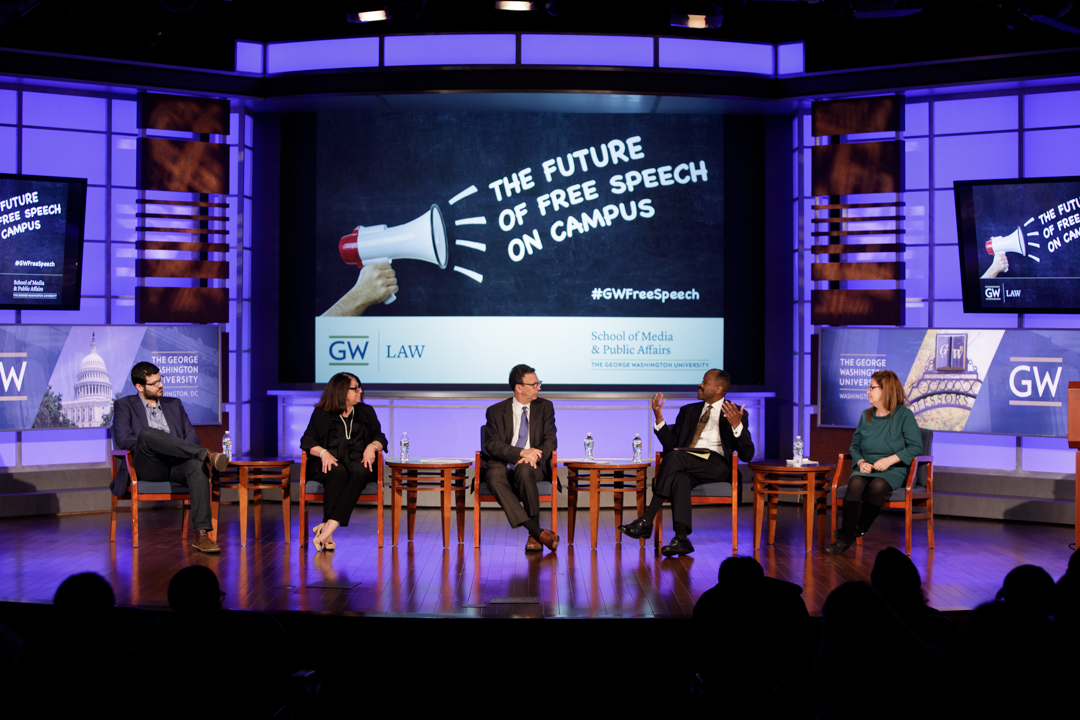By Tatyana Hopkins (A version of this article originally appeared on GW Today.)
Whether you agree with President Donald Trump or his polices, his use of social media and the manner and tone in which he sends his messages have affected the way average Americans engage with one another, said Frank Sesno, director of the School of Media and Public Affairs at George Washington University.
“The language he uses is nastier, courser, more direct, inflammatory and insulting [than presidents of the past] … and it is nonetheless demeaning civil discourse,” he said.
Sesno moderated a panel Tuesday at Jack Morton Auditorium on the future of free speech on college campuses. The discussion was co-hosted by SMPA and GW Law. The panel included GW Law Dean Blake D. Morant; Joyce McConnell, provost and vice president for academic affairs at West Virginia University; Mark Joseph Stern, a legal writer for Slate magazine; and Dahlia Lithwick, a Slate senior editor.
Sesno opened the discussion acknowledging that the conversation could not occur “without some reflection on our times and the leadership that we have.”
“I’ve had many students in my classes in tears thinking about, not just their grades, but what is happening out there, and there is ample reason for that,” he said.
While noting that 60 percent of college campuses have speech codes that are “vaguely worded and could be used to suppress protected speech,” according to the Foundation for Individual Rights in Education, Sesno posed this question to the panel: “Can campuses be islands, oases, so separate from something that is really redefining our cultural norms, if not our constitution?”
McConnell, who deals with many of WVU’s free speech matters, said that college campuses cannot be islands, but that school leaders could shape how students engage in public discourse.
“As leaders (at a university), we can say what our values are, we can communicate those values, and we can hold people accountable for those values,” she said.
McConnell said one of her first experiences dealing with free speech on campus was when a student group invited Milo Yiannopoulos, a former writer for the alt-right affiliated website Breitbart, to speak on campus. During his speech, Yiannopoulos made disparaging remarks about a faculty member while displaying his photo, resulting in the school having to provide security for the professor.
“I would prefer that (Yiannopoulos) not come back,” she said. “But I understand that as a public institution that needs to be open to different ideas, he may very well come back.”
She said universities are more diverse than they have been in the past, not only in terms of viewpoint but also in the backgrounds of the students.
“It wasn’t that long ago when you went to a college campus and everyone was the same. So, the free exchange of ideas is only something we talked about,” McConnell said. “I am genuinely optimistic, not just about this generation, but about what we’ve also been able to create during this time on college campuses.”
Stern said he also is optimistic about the future of free speech on college campuses. He said the idea that young people being concerned about safe spaces and trigger warnings is “vastly overblown.”
“I think that free speech is going to survive our current moment on college campuses.” Stern said.
“(Young people) might get into a classroom and say, ‘hey, I’m offended by that; that’s extremely offensive to me,’ but that’s speech,” he said. “They might march in a picket line to oppose Richard Spencer, but that’s speech too. They might boycott Nike to take the other end of the spectrum, that’s also expression.”
“It seems to me that but for a few cases on the fringes college students are doing just fine,” Stern said. “Until I see evidence to the contrary, I really don’t see reason to put this on my top ten list of concerns.”
Morant said that universities should be spaces where students face new ideas, but said administrators struggle with how to make sure conversations are “constructive” in light of social media. He said prior to social media it was easier to maintain campuses as a safe space for the exchange of ideas.
“But after social media, that has become more difficult, and the law has not kept up with it,” he said. “As a result, we get a lot of students who have been bullied, individuals who have expressed their ideas, whether they be conservative or progressive, who then on social media get hounded as a result.”
Morant said colleges need to face challenges on guiding civil discourse. “This is the beginning of a conversation that truly educates people on really looking at solutions and looking at ideas that get us to an endgame where we can be civil, disagree, but learn at the same time, he said.”
Lithwick said campuses should consider cost and safety when addressing matters of free speech.
“If you ask a student whether being bullied on [social media] or whether sitting in an auditorium where (Yiannopoulos) says that you are a piece of worthless garbage and should be dead, I don’t think that is experienced as just words— I think that is experienced as an actual assault,” she said. “I think that campuses have to put a premium on safety and more importantly, they have to put a premium on the exchange of ideas.”


